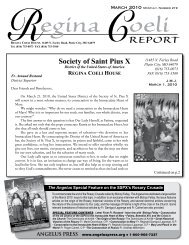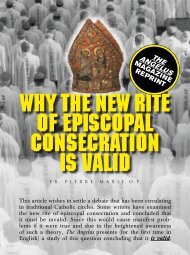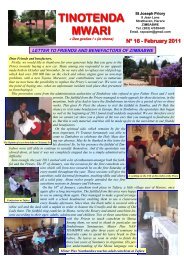Is Feeneyism Catholic? - Society of St. Pius X
Is Feeneyism Catholic? - Society of St. Pius X
Is Feeneyism Catholic? - Society of St. Pius X
Create successful ePaper yourself
Turn your PDF publications into a flip-book with our unique Google optimized e-Paper software.
A NSWER TO OBJECTIONS 99<br />
Baptism is the sacrament <strong>of</strong> the beginning <strong>of</strong> spiritual life 141 :<br />
it is a birth. If that life is later lost by mortal sin, it can be recovered<br />
by the sacrament <strong>of</strong> penance, which is thus like a spiritual<br />
resurrection: it was indeed instituted by Our Lord Jesus Christ on<br />
the day <strong>of</strong> His Resurrection.<br />
Bro. Robert Mary erroneously writes: “All sacraments justify.”<br />
142 No, only baptism and penance. 143 The others must be received<br />
in the state <strong>of</strong> grace: they increase that grace, but do not<br />
give it. If one receives them without the state <strong>of</strong> grace, far from<br />
being justified, he adds a sin <strong>of</strong> sacrilege to his previous ones.<br />
It follows clearly that baptism is the sacrament <strong>of</strong> justification.<br />
To claim the sacrament <strong>of</strong> baptism necessary “for salvation,<br />
not for justification” is to misplace it at the end rather than at the<br />
beginning <strong>of</strong> the spiritual life. No, we should rather hold with the<br />
Council <strong>of</strong> Trent that the sacrament <strong>of</strong> baptism (<strong>of</strong> water) is necessary<br />
for justification, re aut voto–in fact or in desire. Baptism is<br />
necessary for salvation because and only because it is necessary for<br />
justification. Thus it is necessary for salvation in the same way as<br />
it is necessary for justification, re aut voto–in fact or in desire. 144<br />
What then is needed for salvation? Perseverance in the state <strong>of</strong><br />
grace: “He that shall persevere to the end, he shall be saved” (Mt.<br />
24:13). In one word, to die in the state <strong>of</strong> grace is necessary and<br />
141 <strong>St</strong>. Thomas wrote: “Baptism is the beginning <strong>of</strong> the spiritual life, and the<br />
door <strong>of</strong> the sacraments, whereas the Eucharist is, as it were, the<br />
consummation <strong>of</strong> the spiritual life.” See p.38.<br />
142 Op. cit., p.202.<br />
143 Exceptionally, Extreme Unction for someone contrite for his sins but too<br />
sick to be able to confess them could also restore sanctifying grace.<br />
144 Bro. Robert Mary pretends that here we “circumvent” Canon 5 <strong>of</strong> the<br />
Council <strong>of</strong> Trent, which says: “If anyone says that Baptism is optional, that<br />
is, not necessary unto salvation, let him be anathema.” But, as the honest<br />
reader can see, we do not say that it is not necessary; we say with the Council<br />
<strong>of</strong> Trent that it is necessary re aut voto! Bro. Robert Mary’s criticism on this<br />
chapter is <strong>of</strong> the same kind: it falls <strong>of</strong>f the mark, it is not to the point. And<br />
his last one turns against him: indeed, he who “constructs premises from<br />
which it follows that dogmas are historically false or dubious” (decree<br />
Lamentabili) is not me, but rather Fr. Feeney, from whose faulty exegesis and<br />
construed premises on the baptismal character it follows that the Church<br />
erred in teaching baptism <strong>of</strong> blood and desire, and had a false understanding<br />
<strong>of</strong> the dogma extra Ecclesiam nulla salus.











